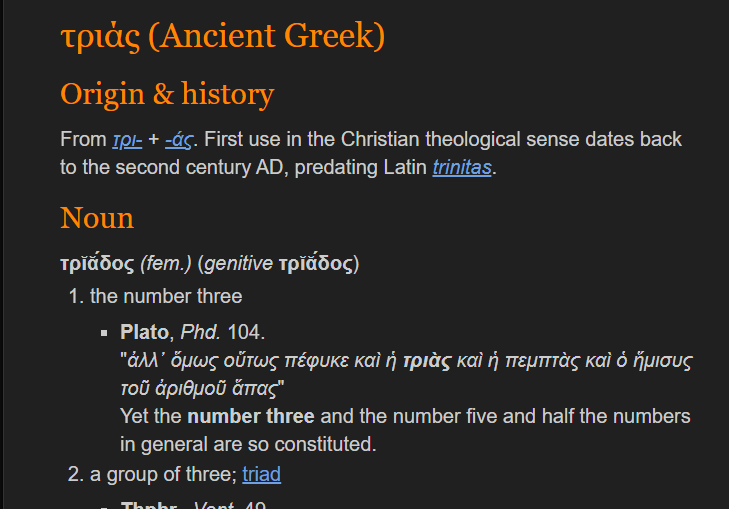God's Name Found in the Greek Scriptures under θεόν (theon).
Comments
-
"The different cases inflect different meanings."
Case is inflection. Inflected noun forms do not change the meaning of the noun. Those forms only identify what grammatical function that particular noun is performing within a sentence, i.e., subject, object, indirect object, singular, or plural.
"Your claim is that all cases are the same is totally inaccurate. The fact there are so many different cases of god in Greek prove not all cases are equivalent nor the same."
You have yet to supply the evidence for what you state above. What lexicon do you have which has individual headword entries for the inflected forms of θεός – θεοῦ, θεόν, θεέ? With each of those separate entries having their own individual dictionary meaning?
"One can easily insert Jehovah into such 'superlative titles' for they are Accusative Cases."
You must have an issue with memory. Not all occurrences of θεόν in scripture have Yahweh as the referent (Ex. 4:16, 7:1; Judges 8:33; 1 Sam. 5:7; 2 Ki. 1:2-3, 6, 16; Judith 3:8; Ps. 44:20; Wisd. 14:15, 15:8; Jonah 1:5; Is. 44:10, 17; Acts 19:37, 28:6).
And outside scripture θεόν is widely used in Greek literature; so, inserting "Jehovah" in all these instances is what you suggest as well?
"θεοῦ refers to (τὸν θεόν) but in Greek Grammar the predict indicates the identity of the subject."
"Case in Point... Jesus is the Word of God (τὸν θεόν)."
"Even though this statement is accurate and true, Jesus is not (τὸν θεόν) nor the Everlasting God. Proper Greek etiquette is that the predicate identifies the Word rather than whose Son he is... therefore, that same sentence would be rendered in a DIFFRENT case θεοῦ."
Your "case in point", contrary to your attempt of making theological statements appear as governing this language's grammatical structure and reason is faulty at best.
θεοῦ is still "god" by definition and is used because of the function it is performing within that sentence – prepositional phrase modifying "Word" – where the genitive is either possessive, or denoting source.
"But Notice Jesus Christ response to Satan, also using the Proper Greek Noun."
I will disagree that θεός is to be considered as a "Proper Noun" – Yahweh, on the other hand is a proper noun.
- A proper noun is defined as a noun which cannot be “pluralized”—thus it does not include titles. A person’s name, therefore, is proper and consequently does not fit the rule. But θεός is not proper because it can be pluralized
- This is a good illustration of the fact that θεός is not a proper noun (from the Greek perspective),
(Wallace, Daniel B., Greek Grammar Beyond the Basics: an Exegetical Syntax of the New Testament. Accordance electronic ed. Grand Rapids: Zondervan, 1996.)
I would argue that θεός is a common noun; as the word represents a class, or type, of Being.
It seems all gods have personal proper names, i.e., Yahweh, Zeus, Athena, Baal, Marduk, Dagon, etc.
This is brought out quite well in Acts 17:23 where "unknown" qualifies that the personal name of this particular god is not known by the people. Consequentially, they did not build an alter named "god".
- Common noun (Gram.), the name of any one of a class of objects, as distinguished from a proper noun (the name of a particular person or thing).
(Webster’s Revised Unabridged Dictionary. Accordance electronic edition, version 1.7. Springfield: C. & G. Merriam Co., 1913.)
"We see two different forms of god with different meanings in the next two scriptures."
Your reference to Mt. 4:3, 10 as supporting your idea is still faulty.
If you should ever take the time to consult with your favorite Strong's Concordance on this, you will see that both θεοῦ and θεόν have the identical Strong's number G2316; which, is identical to the numbering for the dictionary headword θεός which they fall under in meaning.
θεός, and its inflected forms, θεοῦ, θεόν, and θεέ, all carry the definition "god". Which god is to be discerned by the context in which the word is found.
In the phrases, "Son of God" and "the Lord your God", the word "God" is the same "God" in reference, and meaning, contrary to your statement above.
The first reference is prepositional (genitive), and the second is appositional (accusative) to the object Lord (accusative) – the language's grammatical function at work.
You may remember the following as it has been referenced numerous times in this thread.
- Often people are confused by the fact that Greek nouns change form, depending upon their grammatical usage in a sentence.
- Greek is an inflected language, and its nouns are declined, meaning they take a different form when they are subject, object, indirect object, plural, etc.
- These changes in forms do not impact the actual meaning of the noun itself, only how it is being used in a particular sentence. (emphasis and format mine)
(White, James R. The Forgotten Trinity: Recovering the Heart of Christian Belief. Accordance electronic edition, version 1.0. Bloomington: Bethany House Publishers, 1998.)
"Glad that you noticed that the case theos used towards Jesus was a Nominative Case and not the Accusative Case."
Which is due to grammatical function of the language. And not as you have attempted previously on page one of this thread to enlist the text as supporting your premise.
In not one of your responses regarding θεός have you shown that the dictionary meaning "god" is not carried by its inflected forms, θεοῦ, θεόν, and θεέ.
Instead your argumentation, in spite of its faults, has inadvertently demonstrated that the dictionary meaning "god" applies to all the inflected forms of θεός.
-
@Pages θεοῦ is still "god" by definition and is used because of the function it is performing within that sentence – prepositional phrase modifying "Word" – where the genitive is either possessive, or denoting source.
@Brother Rando θεοῦ is ALWAYS genitive and dos not imply to Jehovah because JEHOVAH is (τὸν θεόν) an Accusative and Singular Noun. It's never plural... there is only One true God as Jesus stated in prayer at (John 17:3)
- θεοῦ doesn't mean god but rather 'of God' which tells us the identity of the Word or Son. Jesus is the Son of God or Word of God, both cases 'of God' are genitive and Non-Accusative. You simply are in denial that Jesus is the Christ, the Son of the living God. So the Word, the Son, or the Christ are all genitive showing that Jesus is not the Everlasting God. Jesus is theos (a god) which is a Feminine noun that is NOMINATIVE which is Singular and Non-Accusative. He was begotten, came into existence by JEHOVAH (τὸν θεόν). The fact remains you cannot offer any scripture that would state otherwise.
@Pages I would argue that θεός is a common noun; as the word represents a class, or type, of Being.
It seems all gods have personal proper names, i.e., Yahweh, Zeus, Athena, Baal, Marduk, Dagon, etc.
This is brought out quite well in Acts 17:23 where "unknown" qualifies that the personal name of this particular god is not known by the people. Consequentially, they did not build an alter named "god".
That's why you reject the teaching of Christ at (Matthew 4:10) A piece of wood pagans call god (θεός) doesn't equate with (τὸν θεόν). Reasoning with you is like trying to reason with a demon. They are poisoned and cannot be cured. But I will try for the sake of others who are being misled by your demonic teachings.
@Pages I will disagree that θεός is to be considered as a "Proper Noun" – Yahweh, on the other hand is a proper noun.
First of all, Jesus did not use θεός towards JEHOVAH in (Matthew 4:10) The Proper Noun is (τὸν θεόν). That is why I also gave you the link to show you (Matthew 4:10)
@Brother Rando But Notice Jesus Christ response to Satan, also using the Proper Greek Noun.
Then Jesus said to him, “Go away, Satan, for it is written, ‘You shall worship the Lord your God and serve only him. (Jesus invoked the 'superlative title' (τὸν θεόν) referring to Jehovah as the Everlasting God and (the ONLY True God in John 17:3)
Yet lying and being deceptive comes natural to a trinitarian because they are in a demonic cult unable to escape its demonic teachings. Here's a snap shot of the Greek to expose your DECEPTION that Jesus was using θεός. He wasn't... Jesus invoked the 'superlative title' (τὸν θεόν) highlighted in purple.
The Scripture Jesus quoted was a Hebrew Scripture with God's Name in it that was removed by the demonic trinitarians. However they forgot to remove the 'superlative title' (τὸν θεόν) 😀 Notice Jesus stated "It is written" means he was quoting.
Then Jesus said to him: “Go away, Satan! For it is written: ‘It is Jehovah your God (τὸν θεόν) ACCUSSATIVE you must worship, and it is to him alone SINGULAR you must render sacred service.’” (Matthew 4:10)
And you must listen, O Israel, and carefully observe them, so that you may prosper and become very many in the land flowing with milk and honey, just as Jehovah, the God of your forefathers, has promised you.4 “Listen, O Israel: Jehovah our God is one Jehovah. (Deuteronomy 6:3-4)
Just like θεός (kyrion) is very ordinary and average. In many scriptures the demonic trinitarians removed God's Name and placed kyrion but they forget to remove (τὸν θεόν) that Jesus emphasized. Most people miss it, as yourself have been led astray. However... if you did some research which you won't you would find the LORD used in a majority of Bible to hid God's Name.
You never did show that (τὸν θεόν) is anyone else but JEHOVAH. Then @Brother Rando said to him: “Go away, @Pages! For it is written: ‘It is Jehovah your God (τὸν θεόν) ACCUSSATIVE you must worship, and it is to him alone SINGULAR you must render sacred service.’” (Matthew 4:10)
-
@Pages You must have an issue with memory. Not all occurrences of θεόν in scripture have Yahweh as the referent (Ex. 4:16, 7:1)
You're claiming that Moses is (τὸν θεόν). Hogwash... τὸν θεόν never means (a god) ...... that would be theos but I will roll with it.
- καὶ αὐτός σοι προσλαλήσει πρὸς τὸν λαόν καὶ αὐτὸς ἔσται σου στόμα σὺ δὲ αὐτῷ ἔσῃ τὰ πρὸς τὸν θεόν (Ex. 4:16)
- And he will speak for you to the people, ⌊and then he will be to you as a mouth, and you will be to him "as" a god. (Ex. 4:16)
- And he will speak for you to the people, ⌊and then he will be to you as a mouth, and you will be to him "as" Jehovah.
- And he will speak for you to the people, ⌊and then he will be to you as a mouth, and you will be to him "like" Jehovah
The other scripture also refers to Jehovah.
- καὶ εἶπεν κύριος πρὸς Μωυσῆν λέγων ἰδοὺ δέδωκά σε θεὸν Φαραω καὶ Ααρων ὁ ἀδελφός σου ἔσται σου προφήτης (Ex 7:1)
- And Yahweh said to Moses, “See, I have made you "as" a god to Pharaoh, and Aaron your brother will be your prophet. (Ex 7:1)
- And Yahweh said to Moses, “See, I have made you "as" Yahweh to Pharaoh, and Aaron your brother will be your prophet.
The phrase (a god) is nominative and non-accusative. So using τὸν θεόν the Accusative case as nominative noun is wrong and deceptive. Unless you have understanding then you understand. But your a blind man asking me to turn on the lights for you is FUTILE.
Using τὸν θεόν to promote Jehovah as ordinary is akin to removing Christ from scripture which your KIND as done. (Mark 1:34 LEB) "to be Christ" was omitted.
By the way, Michael means 'who is like τὸν θεόν' or τὸν θεόν like? The qualitive sense should be theos as in J 1;1c. That's why trinitarians falsely claim Jesus is God, because he is godlike.... However MOSES was clearly exalted above the Christ and given the 'superlative title'? I think not.....it refers back to Jehovah.
-
"θεοῦ is ALWAYS genitive and dos not imply to Jehovah"
First, I think you meant to write does not apply to instead of your "dos not imply to".
Second, who is it that has stated θεοῦ is not always genitive?
Third, when you write "dos not imply to Jehovah" above, are you actually saying, given the context, that in the following phrases, "Son of God", "word of God", "mouth of God", "house of God", "Spirit of God", and "kingdom of God", that the genitive θεοῦ is not in reference to Jehovah?
"because JEHOVAH is (τὸν θεόν) an Accusative and Singular Noun."
θεόν, in scripture, does find Jehovah as a referent; but, it also finds others than Jehovah as referents as well. This is one of the major issues, and failings, in your thesis starting from page one of this thread.
On that page, in your initial post, you take great pains to make it clear that θεόν is reserved for, and given to, only Jehovah alone – "But θεόν (theon) refers to only to the True God as in (John 17:3). θεόν (theon) is a superlative title given to Jehovah alone.". (emphasis mine)
In that same post near the end you assert the following, "Inserting God's Name doesn't flow smoothly in all 148 Greek occurrences.". (emphasis mine)
Just as you have most recently stated above, "because JEHOVAH is (τὸν θεόν)", another direct, and open, theological assertion; made without any regard for the workings of grammar within this language.
It is quite apparent from your many assertions that these statements are absolute and universal in scope, as they are without any qualification or exception being placed upon them.
Yet, even scripture, itself, both NT and OT witness to the error of those statements (cf. Acts 19:37, 28:6; and LXX Ex. 4:16, 7:1; Judges 8:33; 1 Sam. 5:7; 2 Ki. 1:2-3, 6, 16; Judith 3:8; Ps. 44:20; Wisd. 14:15, 15:8; Jonah 1:5; Is. 44:10, 17)
Then there is also the great abundance of referents found within Greek literature who are not Jehovah.
Stated numerous times throughout this thread has been the call to state what is truthfully the case – θεόν, in scripture, mostly finds its referent in Jehovah, not always. Additionally, the call for your "all 148" NT occurrences to correctly reflect the number 146.
After all this time you have yet to remedy your asserted errors.
"It's never plural..."
Never?? The plural accusative does exist in the language.
"there is only One true God as Jesus stated in prayer at (John 17:3) "
I have no disagreement with the above; but, grammar, not theology is under discussion.
"θεοῦ doesn't mean god but rather 'of God' which tells us the identity of the Word or Son."
Semantics, but truly, what meaning do you reference for "God" in 'of God'? Do you use the dictionary meaning from some other word than θεός? If so, which word?
"Jesus invoked the 'superlative title' (τὸν θεόν) highlighted in purple."
The Strong's #2316 given to θεόν in your screenshot refers back to what noun? The noun θεός – just click on that Strong's number for θεόν in Mt. 4:10 when you are next at bible.hub.
As stated previously in this thread if θεόν, an inflected form of θεός, is a "superlative title" then so too is the dictionary headword θεός a "superlative title" along with the genitive, dative, and vocative forms.
Your severing the accusative from its lexeme and providing an entirely separate dictionary meaning for it is without lexical or grammatical support within the language. That position you maintain is without any legitimate support. Hence, you provide none but unfounded assertions.
"You're claiming that Moses is (τὸν θεόν). Hogwash... τὸν θεόν never means (a god) ...... that would be theos but I will roll with it."
Not at all, the above is your attempt to spin your error. And, that error is of your own making, exemplified by your own thesis of this very thread regarding θεόν.
What do your assertions say without exception – "But θεόν (theon) refers to only to the True God as in (John 17:3). θεόν (theon) is a superlative title given to Jehovah alone.". (emphasis mine)
Those statements above make every, and all, referents of θεόν (anarthrous, or articular) in any literature to be Jehovah. Nothing in those statements provides for exception to this rule, or the constraint to a specific literary corpus – it is a wide-open field day for failure.
As further proof for my assessment above, don't forget this assertion of yours proclaiming "all 148 occurrences" of θεόν in the NT were Jehovah; which, included both Artemis and Paul in that 148 number.
It is the logical outcome of your own assertions that you object to, and fight against, when more than a superficial glance is given to them and they are questioned. Those assertions do not pass any critical test for truth due to research error combined with the poor choice of wording used to express them.
As far as this statement "τὸν θεόν never means (a god)" goes, you contradict yourself with the translation of Ex. 4:16 – "And he will speak for you to the people, ⌊and then he will be to you as a mouth, and you will be to him "as" a god." (emphasis mine)
- καὶ αὐτός σοι λαλήσει πρὸς τὸν λαόν, καὶ αὐτὸς ἔσται σου στόμα· σὺ δὲ αὐτῷ ἔσῃ τὰ πρὸς τὸν θεόν. (emphasis mine)
(Swete, H. B. (1909). The Old Testament in Greek: According to the Septuagint (Ex 4:16). Cambridge University Press.)
And, if you prefer to say θεόν in Ex. 4:16 is Jehovah – you have confirmed that all referents of θεόν are Jehovah just as your assertions state. Clearly, in Ex. 4:16 Moses is the referent of θεόν.
"So using τὸν θεόν the Accusative case as nominative noun is wrong and deceptive."
Unfortunately, the above, along with many other examples throughout this forum, are a prolific demonstration of you having little, or no, idea of what you are saying – the above is nonsensical.
-
@Page - when you write "dos not imply to Jehovah" above, are you actually saying, given the context, that in the following phrases, "Son of God", "word of God", "mouth of God", "house of God", "Spirit of God", and "kingdom of God", that the genitive θεοῦ is not in reference to Jehovah?
None of things point to the Eternal and Everlasting God τὸν θεόν'. The different case of theos that is used in these examples is θεοῦ which is a Genitive Singular Masculine and is ALWAYS in the genitive case. Jehovah was never made created or begotten. Jah is ETERNAL and Everlasting. Jah has No Beginning nor does he have an end.
The trinitarian lie that all cases are the same is an outright untruth. τὸν θεόν' is non-genitive and in the Accusative Case of theos. Matter of fact theos is Nominative and never in the Accusative Case. Therefore τὸν θεόν' is the 'superlative title' that belongs to Jehovah alone and not shared by others.
Jesus and Satan both share theos that are nominative and or genitive
- Son of God - genitive
- Christ of God - genitive
- Temple of God - genitive
τὸν θεόν' made Jesus both Lord and Christ. Jehovah (τὸν θεόν') was never made or exalted because Jehovah is the Most High over All the earth. (Psalm 83:18)
The trinity is a genitive feminine noun that was made to come into existence by Satan, a demonic teaching that omits CHRIST.



